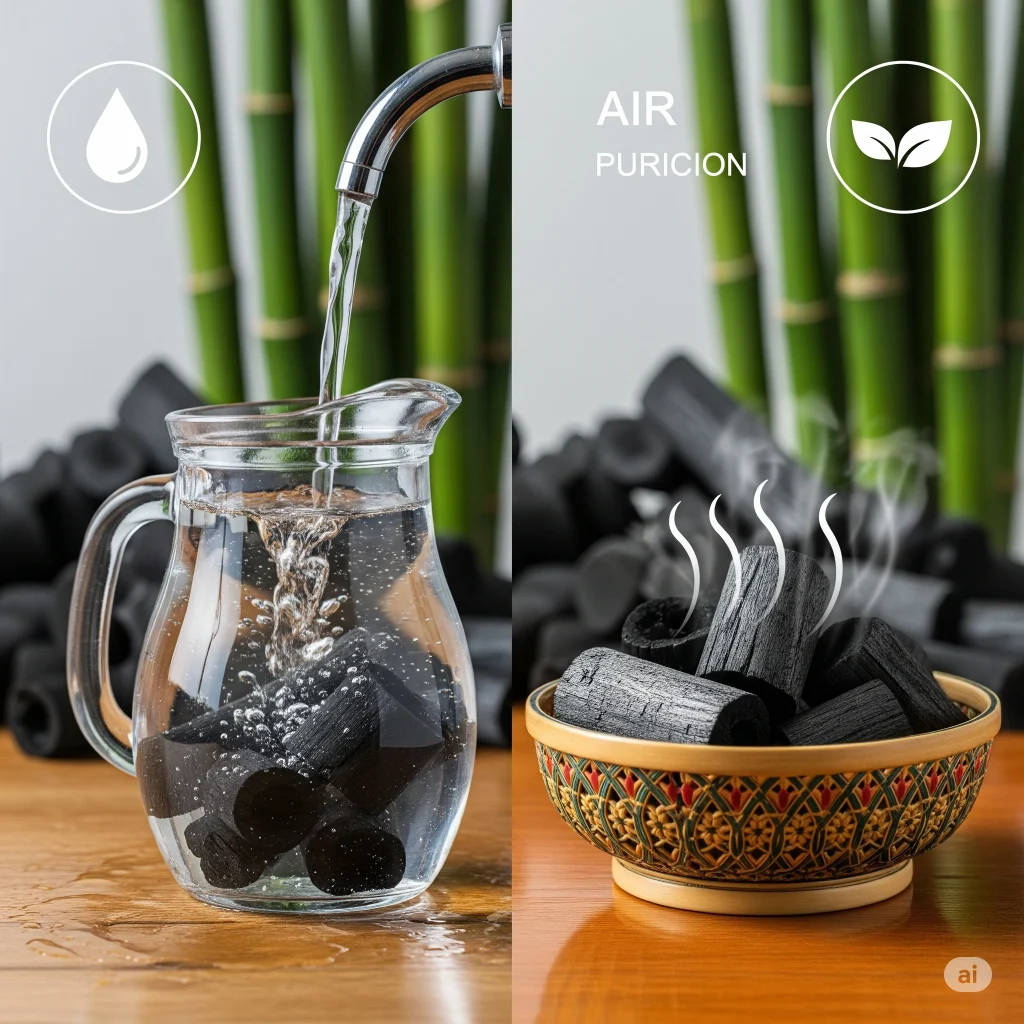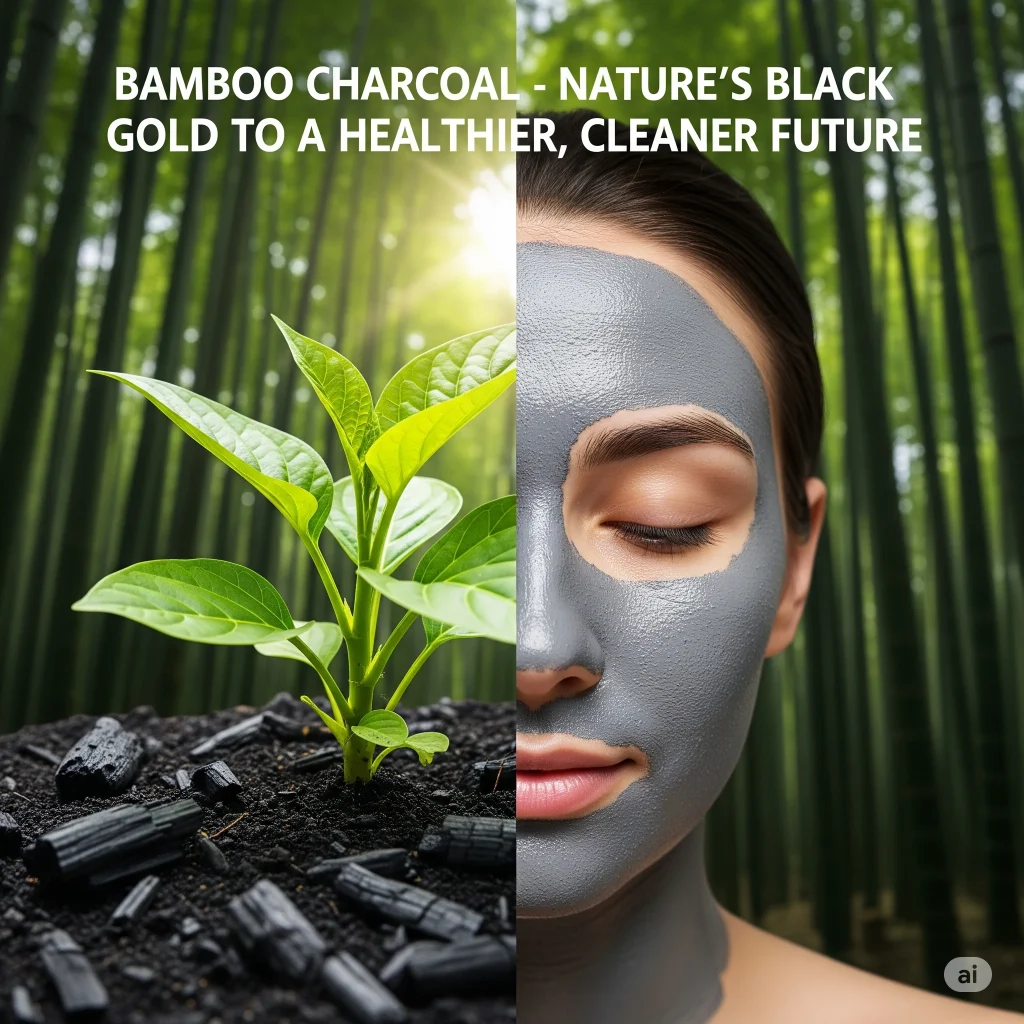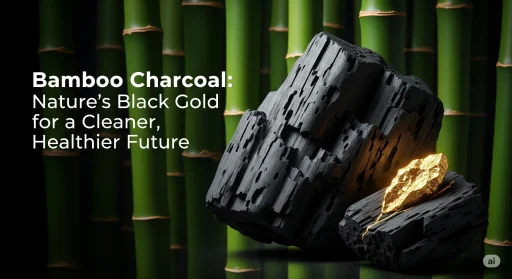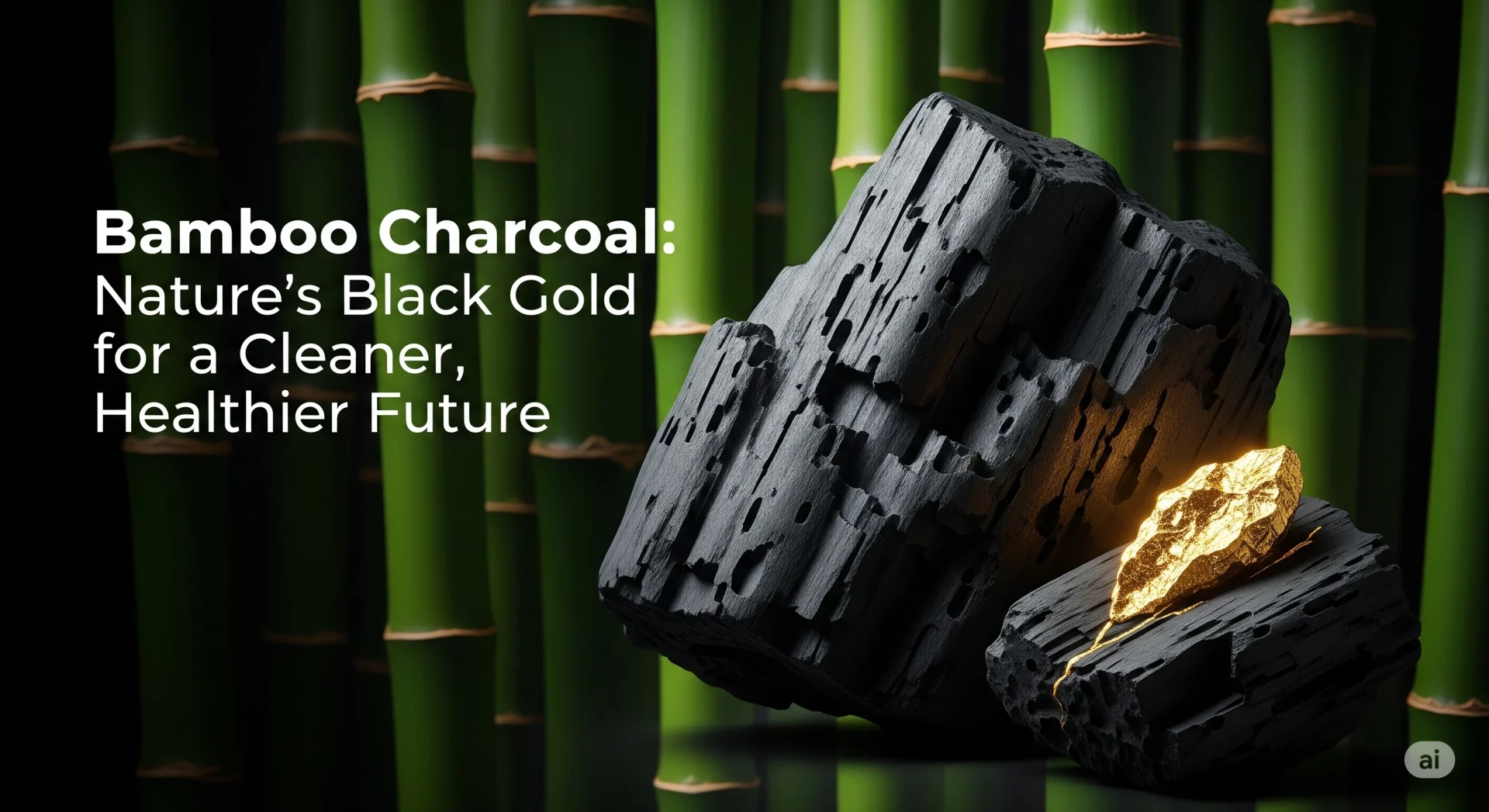Bamboo charcoal is made by heating bamboo without oxygen. It’s a lightweight, black material. The charcoal looks similar to wood, but is made from bamboo. Bamboo is a fast-growing plant, making this charcoal a renewable resource. Bamboo charcoal is used in many different ways by people: to purify water, freshen up rooms, improve soil and even in toothpaste or face masks.
This article describes what bamboo charcoal is and how can you make it, as well as its top uses, safety advice, environmental effects, the companies that make it, and simple ways to use it yourself.
What Is Bamboo Charcoal
Bamboo charcoal is made by heating bamboo at high temperatures with little or no oxygen. The heat removes many volatile chemicals and water. What remains is a black porous solid that contains mainly carbon. Bamboo charcoal has a high surface area due to its porous structure. Bamboo charcoal is able to trap chemicals, odors and moisture. The highly porous, cleaned-up form is called “activated charcoal”. Activated Bamboo Charcoal works better for filtration.

How To Make Bamboo Charcoal In Plain Steps
- Harvest Bamboo: Producers harvest mature bamboo stalks. Mature bamboo stalks make good charcoal.
- Remove moisture from the bamboo surface: The bamboo is dried to remove any surface moisture. The drying process takes time, but it saves fuel when heated.
- Carbonize: The bamboo is placed in a sealed drum or kiln and heated. The oxygen is kept very low to prevent the bamboo from burning into ash. The heat ranges between a few hundred and several hundred degrees Celsius. The bamboo slowly transforms into charcoal.
- Cool down and collect: They cool the charcoal after the heat cycle and then open the kiln and remove the pieces.
- Activate: In order to make activated carbon, steam, CO2 or chemical agents like potassium hydroxide are used at higher temperatures. This process increases the surface area and opens up more pores.
- Washing and drying (for certain products): They wash and dry the product if they use chemicals.
- Package: They grind or shape charcoal into powders, granules or blocks for sale.
If you have a safe kiln at home, it is possible to make small quantities. However, safety measures is necessary. When done correctly, industrial methods produce better quality and cause less pollution.
Read More: 15 High-Demand Manufacturing Startup Ideas for MSMEs and New Entrepreneurs
Raw Bamboo Charcoal And Activated Bamboo Charcoal
- Raw Bamboo charcoal: Made from carbonizing bamboo. It is porous and one can use it for fuel, air flow, and general odor control.
- Activated Bamboo Charcoal: Produced by an extra treatment (steaming or chemicals) that increases the surface area and tiny pores. It is very effective at adsorbing gases, dyes and heavy metals. One can use it for air filters, water filters, and medical adsorbents.
Think of activation like “supercharging” charcoal to grab more molecules from the air or water.
Bamboo Charcoal: Key Properties
- Porousness: Bamboo Charcoal has many small holes. These holes provide a large surface area within the charcoal.
- Adsorption Charcoal attracts molecules and holds them on its surface. It does this by trapping odors and removing impurities.
- Charcoal in chunks is lightweight but strong.
- pH buffering Some bamboo charcoals can slightly alter the pH of soil or water toward neutral. This can be helpful to some plants.
- Charcoal has thermal properties. It burns cleanly and holds heat.
The most common uses of these filters are: deodorizing, soil improvement, fuel, and filtering.
Bamboo Charcoal: Top Uses Explained
Purification of water
You can use Bamboo charcoal to remove chlorine and other organic chemicals as well as bad tastes, odors, and taste from water. It can also absorb some dyes and pesticides. In water filters, charcoal granules are often used in cartridges. Water flows through the granules, removing many molecules that are unwanted. Filter water slowly for best results and replace the cartridge with charcoal regularly.
Air purification and odor Control
The bamboo charcoal sachets or bags act as tiny sponges to absorb odors and moisture. Place them in your shoes, wardrobes, cars, or refrigerators. The charcoal reduces dampness and adsorbs odor molecule. You can “recharge” the bags by putting them in the sun for a couple of hours every month or so. The sunlight releases the molecules trapped and dries out the charcoal.
Biochar for soil amendment and gardening
You can also help by adding small amounts of biochar (also known as bamboo charcoal) to potting soil or garden soil. The charcoal is a good source of nutrients and water, and also provides a place for microbes. Farmars use Biochar to improve soil structure and water retention. It also helps plants grow. Mix it well, and use small amounts. Many gardeners begin with a few percentages by volume. They adjust the amount over time as they observe plant responses.
For entrepreneurs and businesses planning to venture into bamboo charcoal production, NIIR offers comprehensive details titled “Bamboo Charcoal Manufacturing Business | Production of Activated Charcoal from Bamboo.” This covers everything from market analysis to manufacturing process, financial planning, and operational setup.
Personal care products and cosmetics
Bamboo charcoal is used in toothpaste, facial cleansers, and face masks. These products contain tiny particles of charcoal that help remove dirt and surface oils from skin or teeth. Do not use abrasive scrubs or charcoal products on sensitive skin. Follow the instructions and only use these products.
Grilling fuel and cooking
Bamboo charcoal is a clean burning, hot fuel. It is preferred by many cooks for grilling. When properly prepared, it produces low smoke and a steady heat. Bamboo charcoal briquettes can burn for longer. Use only food-safe charcoal, and be careful when handling hot coals.
Textiles and household products
Charcoal is infused into textile fibers to create socks, underwear or bedding that block odors. Small charcoal particles absorb moisture and odors on the skin and clothes. The charcoal treatment must be maintained by washing these items gently.
Industrial uses
Bamboo charcoal can be used in gas masks and for solvent recovery. It is also useful for chemical purification. Engineers use bamboo as a source of renewable activated carbon to make specialty filters and adsorbents.
How To Use Bamboo Charcoal In Your Home
- Place a small bag in an old gym or shoe bag. Replace or recharge monthly.
- To reduce the taste of chlorine, add a few charcoal grains to a pitcher with a lid that is tightly sealed. Remove before drinking and wash the charcoal before use.
- For houseplants, mix a small amount of charcoal (a few percentages of the potting mixture) into the soil.
- Use a face mask or soap with bamboo charcoal that is properly labeled once or twice per week. Stop if you notice your skin becoming dry or itchy.
Follow the instructions on the product and do not use charcoal powder in food unless it clearly states that it is safe.
Read Our Project Report On Bamboo Charcoal Manufacturing Business
Safety And Handling – Simple Rules
- Charcoal can cause irritation to the lungs. If you are handling powder, wear a mask.
- Keep out of reach of children and pets. Small powder or pieces can cause choking or ingestion.
- Never eat charcoal powder that is not food grade. Use activated charcoal for medical purposes only under the guidance of a physician.
- Grilling with tongs or heat-resistant gloves is a good idea.
- Charcoal that is moist can become moldy or lose its effectiveness as an odor-control agent.

Notes On Sustainability And Environmental Issues
Bamboo can regenerate much more quickly than trees. Bamboo is a renewable resource when harvested responsibly. Charcoal production still emits gases and requires energy. Improved kilns, such as closed retorts, capture and utilize gases for heat. This reduces pollution and improves efficiency. When possible, choose suppliers that use clean and sustainable manufacturing methods.
If you’re looking for a complete guide—including production steps, investment estimates, feasibility study, and profitability analysis—Read Our Book for the full project blueprint.
Quality Checks For Small Businesses
Check the product quality before selling bamboo charcoal or activated Carbon: low ash, uniform granule sizes, low dust and high adsorption. If you are planning to sell to industrial customers, get basic lab tests done for pH and ash. Check out local safety and labeling regulations.
Want To Know About Which Business Idea Would Be Better For You?
Go Through Our Startup Selector Tool
Conclusion
Bamboo charcoal has many benefits. It is a cleaner fuel, it helps to purify water and air and soil. Bamboo charcoal is a sustainable choice, as it grows quickly. Follow product instructions and select sustainable suppliers when using bamboo charcoal. Bamboo charcoal, when used and maintained correctly, can keep your air, water, and soil cleaner and fresher.
Bamboo Charcoal: FAQs
Q. Is activated carbon the same thing as bamboo charcoal?
Not always. Carbonized bamboo is regular bamboo charcoal. Activated Carbon is charcoal that has been treated with chemicals or steam to increase the pores and absorb more molecules.
Q. Can I drink the water that has been filtered by bamboo charcoal?
Many people use activated charcoal in water filters to remove chlorine and improve taste. Replace the filter cartridge according to manufacturer’s instructions. Never use loose charcoal to treat drinking water.
Q. How can I recharge bamboo charcoal bags with direct sunlight?
Put the bags out in direct sun for 2 to 4 hours per month. The heat and sunlight help to release moisture and odors trapped in the bags, so that they can work again.
Q. Is charcoal safe for the skin?
Many cleaners use charcoal without harming your skin. If your skin becomes dry, flaky, or irritated, stop. Avoid scrubbing your skin too hard.
Q. Is bamboo charcoal environmentally friendly?
It can be if suppliers harvest bamboo responsibly, and use clean kilns. Find out how the sellers produce their charcoal and ask about sustainable sources.






